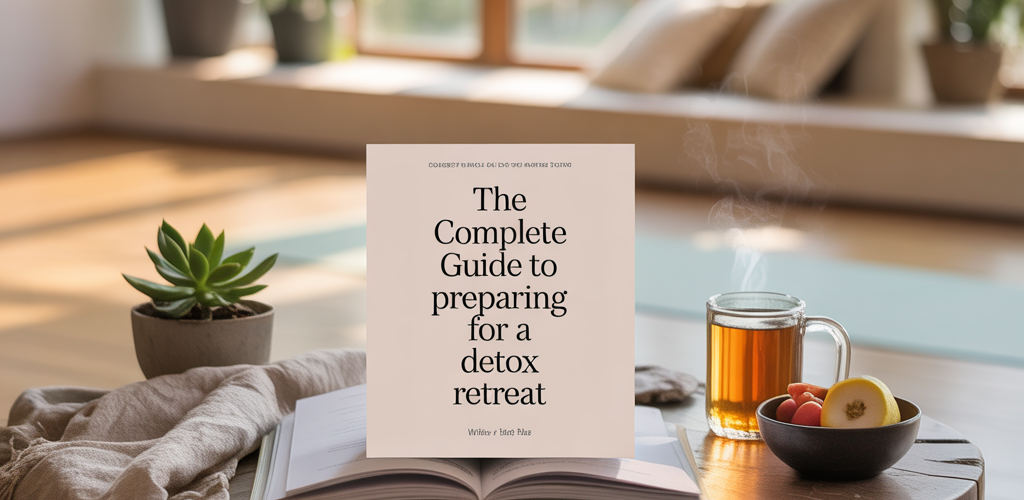Detox retreats have become increasingly popular among wellness seekers looking to reset their bodies and minds. These retreats offer a structured environment where participants can focus on cleansing their systems, breaking unhealthy habits, and rejuvenating their overall well-being. With the growing interest in health and self-care, more people are turning to detox retreats as a way to hit the reset button on their lives. However, preparation is key to ensuring a successful and safe experience. Proper planning not only enhances the benefits of the retreat but also helps you avoid potential discomfort or setbacks.
Preparing for a detox retreat involves more than just packing your bags; it’s about setting the stage for transformation. From adjusting your diet to getting mentally ready, each step plays a crucial role in maximizing the retreat’s effectiveness. At Inside Health Clinic, we specialize in guiding individuals through every phase of their detox journey. Whether you’re a first-timer or a seasoned wellness enthusiast, understanding how to prepare will set you up for success. Now, let’s dive into what detox retreats are all about and how they can benefit you.
Understanding Detox Retreats: What to Expect
Detox retreats are designed to help participants cleanse their bodies while fostering mental clarity and emotional balance. These programs often include activities like yoga, meditation, nutritional workshops, and guided cleanses. Depending on the type of detox-such as juice fasting, raw food diets, or holistic wellness programs-the experience can vary significantly. Some retreats focus solely on physical detoxification, while others incorporate spiritual practices to create a more comprehensive healing experience. Knowing what to expect will help you align your goals with the right program.
Each detox retreat offers unique features tailored to different needs. For instance, a juice detox might emphasize hydration and nutrient absorption, whereas a fasting program could prioritize metabolic reset. Regardless of the method, these retreats provide professional supervision to ensure safety and effectiveness. By choosing a program that resonates with your personal wellness goals, you’ll be better equipped to make the most of your time away. Transitioning into the next step, let’s explore how to find the perfect retreat for you.
Researching the Right Retreat for You
Finding the right detox retreat starts with thorough research. Look for programs that match your goals, whether it’s weight loss, stress reduction, or simply a break from daily life. Consider factors like location, duration, and the types of detox methods offered. It’s also essential to evaluate the qualifications of the staff-ensure they include certified nutritionists, wellness coaches, or medical professionals. Reading reviews and testimonials from past participants can give you valuable insights into the quality of care and overall experience.
Beyond online research, consulting with wellness experts can provide personalized recommendations. Websites like Inside Health Clinic offer resources and guidance to help you navigate your options. Remember, the best retreat is one that aligns with your needs and preferences. Once you’ve identified a few promising choices, it’s time to start preparing your body for the journey ahead.
Pre-Retreat Diet and Nutrition Planning
Adjusting your diet before a detox retreat can make a world of difference. Start by reducing caffeine, sugar, dairy, processed foods, and alcohol in the weeks leading up to your trip. These substances can interfere with the detox process and may cause withdrawal symptoms if consumed right before the program begins. Instead, focus on incorporating whole, plant-based foods like fruits, vegetables, nuts, and seeds. Hydration is equally important, so aim to drink plenty of water throughout the day.
“Most detox programs are gentle. However, deep-cleansing techniques – or full-body resets – are also offered. Regardless of your choice, experienced professionals will guide and supervise you.” -Holistic Health Traveler
In addition to dietary changes, consider adding herbal teas or broths to support digestion and boost immunity. This gradual shift allows your body to adapt without feeling overwhelmed. Think of it as priming your system for the deeper cleanse ahead. As you refine your eating habits, don’t forget to address other aspects of preparation, such as physical readiness.
By easing into healthier choices, you’ll enter the retreat with a cleaner palate and a stronger foundation for success. Next, we’ll discuss how exercise and rest play a vital role in preparing for your detox journey.
Physical Preparation: Exercise and Rest
Entering a detox retreat well-rested and physically prepared can enhance your overall experience. Engage in light forms of exercise, such as yoga, stretching, or walking, to keep your body active without overexertion. These activities promote circulation, reduce stress, and prepare your muscles for any movement-based sessions during the retreat. Avoid intense workouts close to your departure date, as they may leave you fatigued rather than energized.
“Research is the first step you must take. Study other retreats and analyze their activities. Look into trends in health and wellness. You can read guides like those on the Equilibrium Project site for tips on a successful detox retreat.” -Bigteam AI
Prioritizing sleep is equally critical. Aim for 7-9 hours of quality rest each night to allow your body to recover and recharge. Establishing a calming bedtime routine-like reading or meditating-can improve sleep quality and help you feel more centered. With your body primed and your mind at ease, you’ll be ready to embrace the transformative power of the retreat. Speaking of mindset, let’s talk about preparing emotionally for this journey.
Mental and Emotional Preparation
A detox retreat isn’t just a physical cleanse-it’s an opportunity for mental and emotional renewal. Begin by setting clear intentions for what you hope to achieve during your time away. Journaling can be a powerful tool for reflecting on your goals and tracking progress. Practices like meditation and mindfulness training can also help calm your mind and release negative thought patterns that may hinder your experience.
It’s normal to encounter emotional shifts during a detox, so managing expectations is key. Be open to facing challenges and embracing growth opportunities. Cultivating a positive mindset will empower you to navigate any discomfort with grace. With your mental and emotional toolkit in place, it’s time to think about what to pack for your retreat.
“This means you should avoid pasta, white rice, bread and pastries. Other items to avoid are dairy, eggs, hydrogenated oils, sugar and artificial sweeteners.” -Healing Holidays
Packing Essentials: What to Bring
Packing smart ensures you have everything you need for a comfortable and productive retreat. Start with comfortable clothing suitable for yoga, meditation, or outdoor activities. Don’t forget essentials like a reusable water bottle, journal, toiletries, and any supplements recommended by your healthcare provider. Many retreats encourage a digital detox, so check their policy on electronics and plan accordingly.
 If the retreat provides a packing list, use it as a guide to avoid overpacking or forgetting important items. Comfortable shoes, layers for varying weather conditions, and a small bag for day trips are practical additions. Being well-prepared means you can focus entirely on your wellness journey without distractions. Now, let’s explore what to expect during the actual detox process.
If the retreat provides a packing list, use it as a guide to avoid overpacking or forgetting important items. Comfortable shoes, layers for varying weather conditions, and a small bag for day trips are practical additions. Being well-prepared means you can focus entirely on your wellness journey without distractions. Now, let’s explore what to expect during the actual detox process.
Managing Expectations: Challenges and Benefits During Detox
During a detox, it’s common to experience physical and emotional responses like fatigue, mood swings, or heightened sensitivity. These reactions occur as your body adjusts to new routines and eliminates toxins. While these symptoms can be uncomfortable, they’re often temporary and signal progress. Professional supervision ensures you receive the necessary support to manage these effects safely.
“While it is important to begin adjusting your diet pre-detox, it is also important for you to rest well. During the detox, you will undergo physical and emotional changes, which may cause sleep disturbances.” -Healing Holidays
On the flip side, many participants report increased energy, mental clarity, and a renewed sense of purpose after completing a detox program. These benefits highlight the transformative potential of committing to the process. Understanding both the challenges and rewards will help you stay motivated throughout your journey. Let’s take a closer look at what a typical day at a detox retreat might entail.
During the Retreat: Daily Schedule and Activities
A typical day at a detox retreat usually follows a structured schedule designed to optimize wellness. Mornings often begin with gentle movement sessions, such as yoga or tai chi, followed by a nourishing breakfast or fasting period. Educational workshops on topics like nutrition, mindfulness, or stress management are common midday activities. Afternoons may include free time for reflection, journaling, or exploring nature, while evenings wrap up with group discussions or relaxation exercises.
This balanced approach fosters both physical and mental well-being, creating a holistic experience. Participants often appreciate the blend of structure and flexibility, which allows them to fully immerse themselves in the retreat’s offerings. After completing the program, sustaining these newfound habits becomes the next priority.
“Mind-clearing practices including meditation, mindfulness training, and cognitive detoxification techniques that release negative thought patterns and emotional blockages.” -Enhance Health Group
After the Retreat: Integration and Sustaining Results
Returning home doesn’t mean the end of your detox journey-it’s the beginning of integrating new habits into your daily life. Gradually reintroduce foods, focusing on maintaining the healthy practices you learned during the retreat. Consider joining online communities or local support groups to stay accountable and inspired. Resources like Inside Health Clinic can provide ongoing guidance to help you maintain momentum.
Sustaining results requires consistency and commitment. Set realistic goals and celebrate small victories along the way. By prioritizing self-care and staying connected to your wellness journey, you’ll continue to reap the benefits long after the retreat ends. Before embarking on this path, it’s important to address safety and medical considerations.
Safety, Medical Considerations, and Professional Guidance
Before attending a detox retreat, consult with a healthcare professional, especially if you have chronic conditions or specific dietary needs. Ensure the retreat is staffed by qualified professionals who can monitor your progress and provide appropriate support. Many reputable programs conduct initial consultations to assess your suitability for certain detox methods.
“Work out costs and pricing. Find out what expenses you have for the venue, food, instructors, and supplies. Then decide on a price that makes the retreat affordable and helps you cover costs.” -Bigteam AI
Professional guidance minimizes risks and maximizes outcomes, making it a cornerstone of a safe and effective detox experience. Programs offered by trusted clinics like Inside Health Clinic prioritize client safety above all else. With peace of mind regarding medical oversight, let’s discuss budgeting for your retreat.
 Budgeting and Planning for Your Retreat
Budgeting and Planning for Your Retreat
Detox retreats vary widely in cost, depending on factors like location, duration, and included amenities. Research pricing structures to understand what’s covered-meals, accommodations, activities-and identify potential additional expenses, such as transportation or optional services. Some retreats offer payment plans or discounts for early bookings, helping make the experience more affordable.
To stretch your budget, consider off-peak travel dates or shorter programs that still deliver impactful results. Investing in your health is priceless, but finding a retreat that fits your financial situation ensures a stress-free experience. Armed with this knowledge, you’re ready to tackle some frequently asked questions about detox retreats.
Frequently Asked Questions
How long should I prepare before attending a detox retreat?
Ideally, start preparing 1-2 weeks before your retreat. A gradual transition reduces shock to your system and sets a solid foundation for success. This timeframe allows you to adjust your diet, establish healthy habits, and mentally prepare for the journey ahead.
Can I participate if I have specific medical conditions or dietary needs?
Absolutely, but communication is key. Inform the retreat organizers and your physician about any allergies, medications, or chronic illnesses. They can tailor the program to accommodate your needs while ensuring your safety throughout the process.
Will I feel hungry or fatigued during the detox program?
Hunger and fatigue are common during detox, but professional supervision and nutrient-rich meals help mitigate these effects. Staff members are trained to address concerns promptly, ensuring you remain comfortable and supported throughout the program.
What is the difference between a guided detox and doing one at home?
A guided detox offers structure, safety, and expert supervision, whereas a home detox relies on self-discipline and lacks professional oversight. Retreats provide a controlled environment that minimizes risks and maximizes benefits.
How do I choose the best detox retreat for my goals?
Align your goals-whether physical, mental, or spiritual-with the retreat’s specialty, location, and length. Research thoroughly, read reviews, and consult with wellness experts to find a program that resonates with your aspirations.
Conclusion
Preparing for a detox retreat is a journey in itself, requiring thoughtful planning and intention. Thorough preparation, coupled with professional guidance, ensures a safe and transformative experience. From adjusting your diet to packing essentials, each step contributes to your success. Use “The Complete Guide to Preparing for a Detox Retreat” as a trusted resource to navigate every phase of your wellness adventure.
Now is the time to take action. Research potential retreats, create your preparation checklist, and consult this guide whenever needed. Prioritize rest, nutrition, and self-care before, during, and after the retreat to sustain lasting results. Visit Inside Health Clinic today to learn more about how we can support your detox journey. Your path to renewed vitality starts here!

